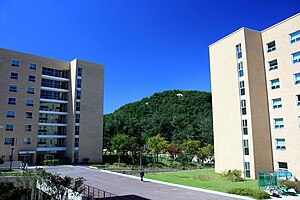Hanzeong National University: Difference between revisions
mNo edit summary |
mNo edit summary |
||
| Line 1: | Line 1: | ||
[[Category:IXWB]] | [[Category:IXWB]] | ||
{{Infobox university | {{Infobox university | ||
Latest revision as of 17:39, 17 June 2024
HZ대학교 | |
| Motto | MottoMZ |
|---|---|
Motto in English | MottoEN |
| Type | Public |
| Established | 1872 |
Academic affiliations | XX |
| Endowment | X |
| Chancellor | Dong Jaseon |
| Vice-Chancellor | XX Choonhee |
| Students | 27,784 |
| Undergraduates | 16,556 |
| Postgraduates | 11,228 |
| Location | , |
| Campus | Urban |
| Callsign | MZ90HNU |
| Colors | Red and yellow |
| Website | X |
Hanzeong National University (HNU) is a university located in Hanzeong, Metzetta, established in 1872 by Emperor Daeku. It is Metzetta's most prestigious university, and one of the nation's flagship universities. The student body consists of nearly 17,000 undergraduate students and over 11,000 postgraduate students. Competition for entry is fierce, with most of the nation's top-scoring secondary school students applying; and the vast majority being rejected.
The current chancellor is Dong Jaseon, and the current vice-chancellor is XX Choonhee, granddaughter of Princess Seulgi and descendant of the Ssuseol Clan. HNU's school colours match the shades of red and yellow seen on the Metzettan flag.
History
Hanzeong National University was formally established in 1872 by Emperor Daeku, incorporating several much older schools (including the nationally renowned Uilyo Hunlyeonso school for doctors) into the new institution with the aim of modernising Metzetta's education system. The university also took over the former home of the Yang District Municipal Library which was conveniently situated for students.
In 1929 the university underwent a rapid expansion following the construction of a new building. A museum was opened in 1949, moving to new premises in 1993 to make way for an art gallery. In 2005 a building with the most up-to-date facilities was constructed to keep the institution competitive.
HNU was responsible for developing the TOMP (Test Of Metzi Proficiency) used to grade international learners on their abilities in the language in 1990, replacing the outdated OMELETTE (Official Metzi Exam for Learners External To The Empire) test formerly employed by the Metzettan government.
Academic Structure
The university offers 83 undergraduate courses and 99 postgraduate courses from 12 departments.
| Humanities | Social Sciences | Business | Arts |
| Natural Sciences | Medicine | International Studies | Law |
| Computing | Engineering | Media | Music |
Campus
HNU's main campus is located in Hanzeong's Yang District and is served by its own station on the Hanzeong Metropolitan Railway beside Jangeomhan Haggyo, as well as several dedicated bus stops. The Olaedoen Daehag, Uilyo Hunlyeonso and HNU Library are clustered close together near Hanzeong City Hall, with the Jangeomhan Haggyo, dormitories and HNU Art Gallery about a mile away. HNU Apeulo, the HNU Museum and Daehag Seupocheu Siseol are located nearby in XXX District.
Olaedoen Daehag
The original building opened in 1872 and comprising the majority of the university at the time, now home to the Department of Humanities and Department of Law as well as some administrative departments including the chancellor and vice-chancellors offices. The current name translates as "old college."
Uilyo Hunlyeonso
Uilyo Hunlyeonso has existed since 1798 as a school for doctors and was folded into the newly formed Hanzeong National University in 1872. Today the building hosts the Department of Business and a student café, as well as the offices for the Students' Union. The Department of Medicine is now hosted in HNU Apeulo.
HNU Apeulo
Apeulo was constructed in 2005 adjacent to the new museum building as a state-of-the-art home for the departments of Medicine, Computing, Engineering and Natural Sciences. The name roughly translates as "HNU Forwards."
Jangeomhan Haggyo
HNU's largest building, hosting the departments of Social Sciences, International Studies, Media, Music and Arts. It was built in 1929. Formerly home to the departments of Computing, Engineering and Natural Sciences before the construction of HNU Apeulo in 2005. Most of the school's administration is now housed here. Includes a grand hall where music and theatre can be performed to the public. The school's various societies are housed here.
Library
HNU's library contains 5 million books as well as a digital library which provides access to university publications, ancient texts, newspapers and theses. The library also hosts some key historical records and is responsible for the publication of the annual journal, X. Home to HNU Press and the HNU Newspaper. The building itself is older than the university, having existed since 1821 as the Yang District Municipal Library, but has been extended several times to make room for more volumes; the Yang District Municipal Library was moved to new premises.
HNU Press is a prolific publisher of textbooks, classic Metzettan texts in the public domain, dictionaries and the annual scientific journal, X.
The HNU Newspaper has been in print since 1958 and is distributed for free on Mondays; however it is not printed during school breaks or exams. It is the nation's most successful university newspaper.
HNU Museum

Opened in 1949, moved to current premises in 1993.
HNU Art Gallery
Opened in 1993, occupying the former museum building.
Daehag Seupocheu Siseol
HNU's sports facilities, home to the university's many sports clubs, comprising XXX.
Student Life
Dormitories

Dorms
Students' Union
Sports
Societies
The HNU Amateur Radio Society callsign is MZ90HNU.
Notable Alumni and Faculty
Alumni
Unmyeong Jin (BA Politics)